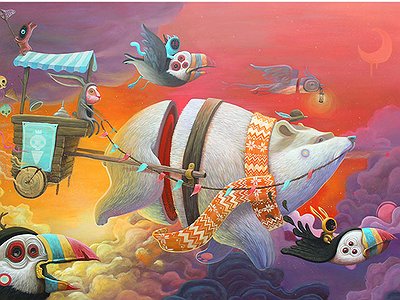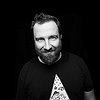Part 2
Can you take me through your process on the basis of a release that's particularly dear to you? How do you decide to release it, what did you start with, what sources did you draw from for all tasks related to it and how did the finished product gradually take shape?
For me it has almost always been the same. Every “big” record requires the equal “deep” record to balance its power. The best example is my first huge release. “The Whistler” was this fun energetic massive A side played by all the big party DJs of the time. “Who’s Afraid of Detroit’ was the brooding thoughtful B side that would be ignored by the hype machine but played by the headz. The Whistler got all the fanfare and Whos Afraid of Detroit slowly got played over two years by everyone. Now, nobody even remembers the banging A Side that was so hyped. But this is my favorite kind of release. I love the synergy of the two emotions and feeling on a record. When Im working on a release the release date is always just 4-6 weeks after I finish it. I can never plan an actual release date because I like to test it so many times in the club. All my worst releases were the ones where I had to hit an exact deadline. Since I am the label boss its very convenient for me because I never have to try and sign anything. It’s automatic. In this way Im very spoiled.
When I'm making the record I pull from anything and everything. I like for everything in my studio to be accessible very quickly. I find that setting up a synth that is plugged is the death of the vibe. But nothing is off limits and I almost always try to use my voice as a sound source in some way. If you listen to my music you might also notice everything I do has a “James Brown note”- meaning a little hit that gives it the funk. it can be voice or a synth hit, but something sets the groove and hits like a James Brown “uhhh!” in almost everything I make. You can hear that for sure in both sides of the Whistler and Who's Afraid of Detroit.
Could you take us through a day in your life, from a possible morning routine through to your work? Do you have a fixed schedule? How do the label and other aspects of your life feed back into each other - do you separate them or instead try to make them blend seamlessly?
When Im not on tour I get up at 7am to get the kids ready for school with my wife. After they are off I go to the office/studio in our back house. I try to have a short meeting with my day to day manager Abi and also our clothing producer, Esther. I usually have a short chat with Max, my booking agent as well. Then I work in the studio on music until 4pm. At 4 I have a recap meeting with Abi and then I try to get any interviews done or answer any questions. On Thursdays I dedicate the entire day to the business and I do not work in the studio at all just so there is at least one day where everyone can get answers and approvals on everything we are doing. At 5 or 6pm I go back to the front house and we make dinner and I hang with the kids until bedtime. Then I usually watch something on TV but I almost always pass out. On occasion I make a second trip back to the studio.
There are many descriptions of the ideal state of mind for being creative. What is it like for you? What supports this ideal state of mind and what are distractions? Are there strategies to enter into this state more easily?
There is creative time and then there is moving stuff around and mixing time. You want to get as much creative time as possible because it can be argued that the second part any sound engineer can handle. This is something I am constantly working on. I even have kind of a time management / creativity tutor named Mike Monday. I have so many pots boiling that it can get quite insane. if you add the family and the touring my mind can easily slip into a non-creative mode on a daily basis. I am constantly fighting to try and stay creative and have that creative peace that I need. I think you need alone time and some sort of settled brain to get really in the zone so I am always striving towards that. I use meditation and excersize and lots of tools to try and get there every day. You have to fight for it.
How is listening to the actual music and writing or reading about it connected? What do you achieve and draw from each experience personally? How do you see the relationship between improvisation and composition in this regard?
I try not to read about music unless Im taking technology classes about it. In that way I am a nerd. Im not the most technical but I want to know about every possible way to manipulate sound. Improvisation is the best way to get to a sound that is your own. But I like to create scenario where I have controlled improvisation, meaning I can sort of repeat a mistake or a weird sound until its exactly how I want it. When I listen to music I have two sets of ears. The fun ears are just there to enjoy it. The critical ears are there to figure out how it was made. Sometimes the critical ears start to mess with the fun ears but that usually means Im about to have a great idea.
There has been an exponential growth in promotion agencies and there is still a vast landscape for music magazines. What's yourperspective on the music promo- and journalism-system? In how far is it influencing your choice of artists, in how far is it useful for potential buyers, in how far do you feel it is possibly undermining your work?
When you are working as long as me professionally this stuff means less and less every year. Ideally I would love to not care at all about it and just do my thing. I think that new artists need coverage desperately and they need lots of it over and over again until they crack into the group of artists that don’t need it as much. Older artists like myself can always resurface with a great piece of music but even so, the fans flip over faster and faster every year. I would say every three years now we have to generate an entirely new fan base and therefore it would be foolish to disregard PR and journalism.
Art can be a purpose in its own right, but it can also directly feed back into everyday life, take on a social and political role and lead to more engagement. Can you describe your approach to art?
My art is very simple I make tools that I want to use in my performances. All my music serves a purpose. I display it during my sets and generate my fan base by creating a “sound” that is rooted in my core art. But another aspect of my art that I rarely talk about is my demeanor. Because I am always performing my art I feel like my actual personality is part of the delivery. That is why I always sign everything, take photos and talk to everyone. I strive to be kind to everyone and I never boast about anything. In this way my art has created a community of like minded people who might not be there if it was only based on my music.
It is remarkable, in a way, that we have arrived in the 21st century with the basic concept of labels still intact. Do you have a vision of labels, an idea of what they could be beyond their current form?
Yes, the traditional record label is gone. Only brands survive. We will get even more artist centric as we move forward. Just try to find the name of the record label on Spotify or iTunes, its hidden and almost removed.
Only the labels that have communities can stay viable. In the future, labels must be a hub for a way of life not just a place that releases music. There will always be the need for a group of like minded artists to band together in a gang or a club or a collective - and this is what a label has to be. In a way there are management companies that are labels now. Like look at TDE and Roc Nation. You know Kendrick Lamar & Schoolboy Q are part of TDE and you probably don’t even know their record labels.






